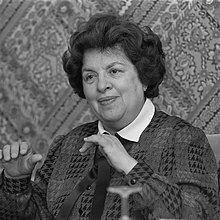Maria de Lourdes Pintasilgo
|
Maria de Lourdes Pintasilgo GCIH GCC |
|
|---|---|
 |
|
| 108th Prime Minister of Portugal | |
|
In office 1 August 1979 – 3 January 1980 |
|
| President | António Ramalho Eanes |
| Preceded by | Carlos Mota Pinto |
| Succeeded by | Francisco Sá Carneiro |
| Consultant of the President of the Republic | |
|
In office 1 October 1981 – 1 February 1985 |
|
| President | António Ramalho Eanes |
| Minister of Social Affairs | |
|
In office 17 July 1974 – 26 March 1975 |
|
| Prime Minister | Vasco Gonçalves |
| Preceded by | Mário Murteira |
| Succeeded by | Jorge Sá Borges |
| Personal details | |
| Born |
18 January 1930 Abrantes, Portugal |
| Died | 10 July 2004 (aged 74) Lisbon, Portugal |
| Political party | Independent |
| Alma mater | Instituto Superior Técnico |
| Profession | Chemical engineer |
| Religion | Roman Catholicism |
| Signature | |
Maria de Lourdes Ruivo da Silva de Matos Pintasilgo, GCIH GCC (Portuguese pronunciation: [mɐˈɾiɐ dɨ ˈluɾdɨʃ pĩtɐˈsiɫɡu]); (Abrantes, São João Baptista, 18 January 1930 – Lisbon, 10 July 2004) was a Portuguese chemical engineer and politician. She was the first and to date only woman to serve as Prime Minister of Portugal, and the third woman to serve as Prime Minister in Europe, after Savka Dabčević-Kučar and Margaret Thatcher.
Maria de Lourdes Pintasilgo was born to a middle-class family in 1930. Her father, Jaime de Matos Pintasilgo (born Covilhã, Conceição, 9 December 1896 – died Lisbon, Socorro, 10 October 1959) was in the wool business, and her mother was Amélia do Carmo Ruivo da Silva, a native of Vendas Novas. Her parents married in Abrantes on 14 March 1929.
Her father, Jaime, abandoned the family and at school she tried hard to hide that, thus causing her to avoid usual relationships. At the age of seven, she was sent to the Liceu Filipa de Lencastre, a secondary school, in Lisbon. She distinguished herself in the Mocidade Portuguesa, a militaristic youth movement founded by Dictator Salazar. Later she joined Acção Católica (Catholic Action). During her years at the Instituto Superior Técnico from where she earned a degree in industrial chemical engineering, she joined and eventually led the Catholic's women's student movement.
...
Wikipedia
